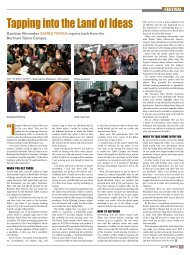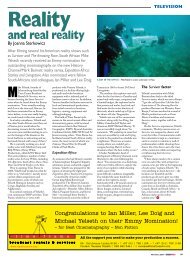Case C - Screen Africa
Case C - Screen Africa
Case C - Screen Africa
You also want an ePaper? Increase the reach of your titles
YUMPU automatically turns print PDFs into web optimized ePapers that Google loves.
Nollywood’s impact on <strong>Africa</strong><br />
The positive or negative influences of film<br />
on the average individual often bring<br />
about a different approach to issues<br />
and their day-to-day relationships.<br />
Just as Hollywood movies can be said to have<br />
influenced the film industries in most part<br />
of the world, Nollywood movies have taken<br />
over a large percentage of filmmaking in<br />
West <strong>Africa</strong>.<br />
According to the director general of the<br />
Nigeria Film and Video Censors Board,<br />
Emeka Mba, Nigeria is currently recognised<br />
as the third largest movie producer in the<br />
world after India and the US. Says Mba:<br />
“Nigerian film products are widely available<br />
and in demand by not only Nigerians but<br />
by other <strong>Africa</strong>ns. The demand for Nigerian<br />
movies outside of <strong>Africa</strong> is driven by a huge<br />
population of expatriate Nigerians and other<br />
<strong>Africa</strong>ns living outside the continent.<br />
“No other realm of endeavour by Nigerians<br />
has so profoundly conveyed the value,<br />
character and promises of the nation in the<br />
global brand view. This is despite the fact<br />
that professionalism and quality are usually<br />
sacrificed on the altar of ‘speed and quantity’.<br />
Furthermore, the vast majority of Nigerian<br />
movies depict aspects of our national life<br />
which often reinforce the negative stereotypes<br />
of Nigerians.”<br />
However, not all movies shot in Hollywood<br />
are of a high quality either. Most Hollywood<br />
movies have presented the average American<br />
on the street as a gun toting individual, but<br />
that has not stopped millions of people<br />
thronging American embassies the world<br />
over.<br />
The Nigerian movie industry had existed<br />
before what is today known as Nollywood.<br />
Movie veterans like Ogunde, Baba Sala and a<br />
host of others shot films that met international<br />
standards. In those days film units were used<br />
purely as agents for acculturation or social<br />
change.<br />
With the advent of Nollywood practitioners<br />
consistently churning out movies every<br />
day, many Nigerian youths who might have<br />
opted for a career in crime have taken to<br />
acting, scriptwriting, wardrobe, make-up,<br />
photography and videography. This trend<br />
has since spilled into neighbouring countries<br />
which have seen the birth of young video club<br />
owners stocking their shelves with the latest<br />
Nollywood movies. Lots of movie sellers have<br />
also emerged.<br />
The successes achieved by some Nigerian<br />
actors not only put the country on the world<br />
map but made a celebrities out of them.<br />
Foreigners from as far as Tanzania come to<br />
Nigeria to purchase the latest Nollywood<br />
movies.<br />
FInancIal prospects<br />
According to the Global Media Entertainment<br />
Outlook Report commissioned by<br />
PriceWaterhouseCoopers (PWC), the film<br />
and entertainment industry is one of the<br />
fastest growing sectors in the world economy,<br />
turning over billions of dollars and generating<br />
millions of jobs. The PWC report projects that<br />
the global entertainment industry is expected<br />
to generate over US$600bn by 2007.<br />
In the last 15 years the Nigerian<br />
industry has experienced tremendous<br />
growth in the television and motion<br />
pictures industries. It’s been argued that<br />
our film industry alone generates over<br />
N30bn worth of economic activities.<br />
Nollywood has over the years turned many<br />
of its practitioners into millionaires and the<br />
financial benefits and prospects accruable<br />
from the industry are enormous. Recently<br />
it has attracted investors form the banking<br />
sector. The banks are beginning to see the<br />
future of an industry that has grown beyond<br />
their wildest imagination.<br />
However, distribution and piracy are<br />
regarded as the two monsters plaguing the<br />
industry today. The majority of the Nollywood<br />
movies found in other countries are pirated.<br />
Some Nigerian movie practitioners have<br />
had to look for measures to curb piracy.<br />
At some point they have collaborated<br />
with government agencies like the Nigeria<br />
Copyright Commission, which came out<br />
with a scheme known as STRAP.<br />
QualIty and IdentIty<br />
There have been some who have complained<br />
about the video and audio quality of<br />
Nollywood movies. But a major issue of<br />
concern is ‘the bandwagon syndrome’,<br />
where a filmmaker produces a film similar<br />
to another just because it has made money.<br />
Often if an actor is used in a particular film<br />
and it is successful, the same actor is then<br />
called upon to appear in the same movie but<br />
under another name and maybe with some<br />
slight changes to either the storyline or the<br />
scenery.<br />
Yet, according to scholar and analyst Zainab<br />
Omaki, despite the flaws<br />
inherent in most Nigerian<br />
movies, Nollywood has<br />
been able to create a sense<br />
of nationhood. However,<br />
she frowns on the<br />
duplicity of storyline and<br />
story lifting. “If civilisation<br />
started in Egypt, I believe<br />
other cultures borrowed<br />
from Egyptian culture<br />
and improved upon it.<br />
That can’t be applied to<br />
Nollywood. Nigerians<br />
have absorbed the art of<br />
filmmaking, but they have<br />
failed to present their own<br />
creativity in their movies.”<br />
Omaki’s main complaint<br />
is that “films are generally meant to<br />
be national signifiers: they reflect the culture<br />
and the beliefs of a society. Nigerian producers,<br />
however, have absorbed western culture<br />
and mixed it with indigenous ones to make<br />
films that are neither Nigerian nor western.<br />
It is common knowledge that media consumption<br />
can affect the way people act. This<br />
is particularly true in Nigeria where much of<br />
the population is under 20 and interested in<br />
Nollywood. These mishmash movies are inspiring<br />
young people to shun their identity<br />
because the values instilled by producers do<br />
not reflect Nigerians objectively.<br />
“The producers rely on an overload of<br />
romantic and interpersonal conflicts, while<br />
the intelligence, creativity and normalcy of<br />
Nigerians are too often missing. By focusing<br />
on the country’s problems, Nollywood films<br />
give their viewers very little pride in their<br />
country. The movies that are not westernoriented<br />
are hardly an improvement, with<br />
their emphasis on black magic or ‘juju’. That<br />
has caused other West <strong>Africa</strong>ns and the rest<br />
of the world to view Nigerians as uncivilised<br />
and untrustworthy.”<br />
West aFrIca<br />
A scan through the TV channels of most<br />
West <strong>Africa</strong>n countries will reveal a large<br />
dominance of Nigerian movies and soaps,<br />
such as 70% in Ghana. Arguably, Nigerian<br />
movies might be said to have changed the<br />
lifestyle of most West <strong>Africa</strong>ns. Most West<br />
<strong>Africa</strong>n countries have adopted some aspects<br />
of the Nigerian dress sense.<br />
A case in point is the Nollywood blockbuster<br />
Abuja Connection and its sequel, which led to<br />
an Afro-like hairstyle in Cameroon becoming<br />
known by the same name. In addition, the<br />
costume design in the movie was also adopted<br />
by some Cameroonian ladies in the belief that<br />
it was the style of the nouveau riche.<br />
Some Ghanaian movie makers now shoot<br />
the majority of their blockbusters using<br />
notable Nigerian actors as leads. This process<br />
AfriCA<br />
The Nigerian film industry, dubbed Nollywood by Western journalists, is known worldwide for its<br />
prolific output. Not only can a thriving film industry impact positively on its national economy, it<br />
can have other far-reaching effects as well. Nigerian industry consultant TAIWO O TAIWO takes<br />
a closer look.<br />
NIgERIAN STORY – Taiwo O Taiwo<br />
has not only yielded a huge turnover in<br />
movie sales in both countries but has created<br />
a synergy and an enabling environment for<br />
ideas exchange and co-existence between<br />
them.<br />
In Uganda there are viewing centres<br />
where citizens flock to see <strong>Africa</strong>n movies.<br />
According to a study titled Survey of Content<br />
and Audiences of Video Halls in Uganda<br />
2005–2006, Ugandans are willing to pay<br />
more money to watch local, East <strong>Africa</strong>n or<br />
Nigerian productions than for Hollywood<br />
and Bollywood blockbusters. Local<br />
productions apart from Nigerian, Ghanaian<br />
and some Kenyan films are very scarce, with<br />
the operators and owners concerned about<br />
copyright issues.<br />
However, some <strong>Africa</strong>ns have complained<br />
that Nigerian films are full of ritual scenes;<br />
trends they feel are crippling to the fabric<br />
of their own society. It should however be<br />
noted that these films were made to show<br />
the repercussions of believing in rituals as a<br />
means to solving life’s problems.<br />
One unique aspect of the average Nollywood<br />
story is that it tells the Nigerian story, with the<br />
tourism potential of the country and its way<br />
of life brought to the fore. Sometimes foreign<br />
producers cash in on Nollywood to produce<br />
movies which they aim to sell mostly in<br />
Nigeria or to Nigerian communities overseas.<br />
An example is Phat Girlz in which <strong>Africa</strong>n-<br />
American actor Jimmy-Jean Louis played the<br />
role of a Nigerian doctor who falls in love<br />
with a voluptuous American lady played by<br />
Monique, another <strong>Africa</strong>n-American.<br />
MovIes as a vehIcle<br />
For change<br />
Former Nigerian president Chief Olusegeun<br />
Obasanjo challenged Nigerian filmmakers<br />
to make movies that would help fight<br />
corruption. Many a filmmaker yielded to the<br />
call and made films that frown upon Advance<br />
Fee Fraud, popularly known as 419. Many<br />
more films exposing Internet fraud were<br />
produced.<br />
To ensure that these films were suitable<br />
for public viewing, the National Film<br />
and Video Censors Board embarked on a<br />
massive campaign aimed at sanitising<br />
the film industry. It declared total war on<br />
dubious practitioners who would not allow<br />
their movies to go through the normal<br />
classification process.<br />
With more and more movies coming out of<br />
Nollywood every week, Nigerian filmmakers<br />
have braved the odds and made good use<br />
of their talent in an economy that was not<br />
conducive to success. They have been able<br />
to tell the Nigerian story to the best of their<br />
abilities. One can only hope that other<br />
<strong>Africa</strong>n countries who continue to watch<br />
these movies are inspired to produce movies<br />
that will tell their own stories.<br />
October 2007 – SCREENAFRICA 43

















